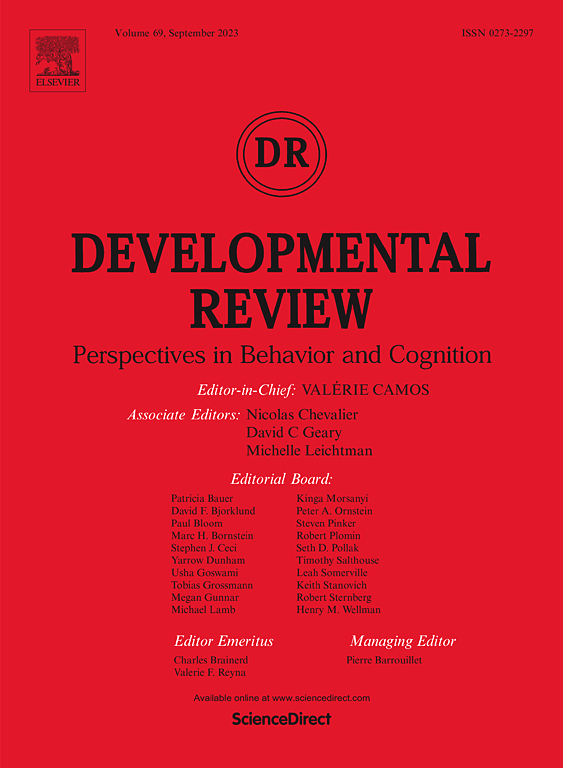Executive functions and social cognition from early childhood to pre-adolescence: A systematic review
IF 5.6
1区 心理学
Q1 PSYCHOLOGY, DEVELOPMENTAL
引用次数: 0
Abstract
In the last few decades, there has been growing interest in the association between executive functions (EFs) and social cognition in the childhood years, but it is not fully understood what aspects of EFs are linked to social cognition. Nor is the direction of these associations clear. This systematic review aimed to organize and clarify the existing knowledge about the links between EFs and social cognition in typically developing children and provide directions for future research. Following the Preferred Reporting Items for Systematic Reviews and Meta-Analyses (PRISMA) guidelines for empirical studies (Moher et al., 2015), we identified 133 concurrent, longitudinal, and intervention studies (reported in 125 papers) that met our criteria and were published between 1995 and 2024. There were four main findings. First, the core EFs were correlated with both cognitive and affective social cognition. Second, most studies examined the associations between EFs and theory of mind (ToM). Third, relativity few studies examined the association between hot EFs and social cognition. Fourth, limited longitudinal and intervention research has been conducted in this field, and while work generally tends to support the impact of EFs on social cognition, there are some contradictory findings on the causal direction between these constructs.
从幼儿期到青春期前的执行功能和社会认知:系统回顾
在过去的几十年里,人们对儿童时期执行功能(EFs)与社会认知之间的联系越来越感兴趣,但人们并不完全清楚执行功能的哪些方面与社会认知有关。这些关联的方向也不明确。本系统综述旨在整理和阐明有关发育正常儿童的情绪控制能力与社会认知之间联系的现有知识,并为今后的研究提供方向。按照系统综述和荟萃分析首选报告项目(PRISMA)的实证研究指南(Moher 等人,2015 年),我们确定了 133 项符合我们的标准且在 1995 年至 2024 年间发表的同期、纵向和干预研究(在 125 篇论文中报告)。主要发现有四点。首先,核心 EF 与认知和情感社会认知都有关联。其次,大多数研究考察了 EFs 与心智理论(ToM)之间的关联。第三,相对较少的研究考察了热点 EF 与社会认知之间的关联。第四,在这一领域开展的纵向和干预研究有限,虽然研究结果普遍倾向于支持外倾因素对社会认知的影响,但在这些建构之间的因果方向上存在一些相互矛盾的发现。
本文章由计算机程序翻译,如有差异,请以英文原文为准。
求助全文
约1分钟内获得全文
求助全文
来源期刊

Developmental Review
PSYCHOLOGY, DEVELOPMENTAL-
CiteScore
11.00
自引率
3.00%
发文量
27
审稿时长
51 days
期刊介绍:
Presenting research that bears on important conceptual issues in developmental psychology, Developmental Review: Perspectives in Behavior and Cognition provides child and developmental, child clinical, and educational psychologists with authoritative articles that reflect current thinking and cover significant scientific developments. The journal emphasizes human developmental processes and gives particular attention to issues relevant to child developmental psychology. The research concerns issues with important implications for the fields of pediatrics, psychiatry, and education, and increases the understanding of socialization processes.
 求助内容:
求助内容: 应助结果提醒方式:
应助结果提醒方式:


